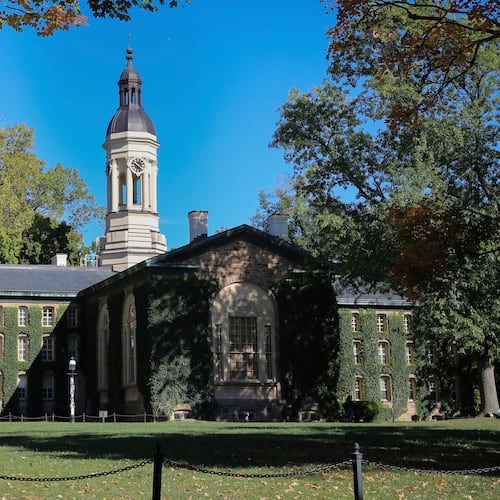In 2020 after the murder of George Floyd, corporations and foundations made commitments to narrow the racial wealth gap and boost diversity, equity and inclusion in academia, business and other corners of civic life.
A series of lawsuits and court victories by conservative groups in recent years chipped away at these efforts and affirmative action in colleges and universities. But even within the context of those setbacks, the past few days have been jarring for supporters of diversity efforts aimed at addressing centuries of racial inequality.
In his first days in office, President Donald Trump rescinded a landmark 1965 executive order prohibiting discrimination in hiring by companies doing business with the federal government. Other directives took broad aim to dismantle diversity, equity and inclusion efforts across the federal government.
And another executive order Trump signed Tuesday deputizes federal agencies to look into corporations, nonprofits, foundations and higher education institutions for “potential civil compliance investigations” over their DEI practices.
The moves have left many corporate leaders uncertain about how to approach their equity initiatives moving forward, wondering if they could be targeted by federal authorities for the work. It has left others feeling like Trump is trying to control their decision-making.
Marc Morial, president and CEO of the civil rights organization the National Urban League, told The Atlanta Journal-Constitution that corporate leaders are privately telling him they think the DEI order is an overreach.
“They don’t like the idea that the president is trying to tell them how to run their businesses through executive orders,” Morial said. “They see it as a form of regulation and a form of direction. And many of the business people I talk to say, ‘I know how to run my business. If I think diversity is good for my growth, I’ll do it. If I don’t think it’s good for my growth, I won’t do it.’”
Rescinding civil rights orders
Opponents to DEI initiatives see them as a form of discrimination based on race, sex or orientation, that may exclude men, white people or straight employees. After nearly 200 years of slavery and segregation, the Civil Rights Act of 1964 officially outlawed employment discrimination based on race, color, religion, sex or national origin.
Building off that law, in 1965, then-President Lyndon B. Johnson signed an executive order that prohibited federal contractors from hiring discrimination based on race, color, religion, sex or national origin.
Trump on Tuesday rescinded Johnson’s order as part of his efforts to dismantle what he has termed “illegal DEI” policies in the public and private sectors in favor of “equality of opportunity for all Americans.”
The president’s move comes after years of conservative efforts to dismantle diversity initiatives through lawsuits and legal threats. Atlanta-based venture capital firm Fearless Fund was sued for alleged racial discrimination in August 2023 over a $20,000 grant program its nonprofit ran for Black female small-business owners. After a yearlong fight, Fearless settled the case last September.
Credit: Mirtha Donastorg
Credit: Mirtha Donastorg
One of Trump’s orders says DEI policies “not only violate the text and spirit of our long-standing Federal civil-rights laws, they also undermine our national unity, as they deny, discredit, and undermine the traditional American values of hard work, excellence, and individual achievement in favor of an unlawful, corrosive, and pernicious identity-based spoils system.”
However, preferences to hire or contract with veterans are excluded from the order.
But supporters of DEI say they are advocating for the same thing as Trump, equal opportunities for all. They also say the practices are just good for business.
“Companies have to do what’s right for them to successfully run their business, operate, compete in the markets they operate in,” David Solomon, CEO of Goldman Sachs, said Wednesday when asked how he is advising companies on DEI during an interview on CNBC. “The legal construct’s changing a little bit, especially when you get into states and different jurisdictions. And so that’s something that we continue to evaluate, and I think other companies continue to evaluate.”
Costco made news this week for pushing back against a shareholder proposal urging the company to evaluate potential business risks from its DEI policies.
The move echoes efforts last spring from Coca-Cola and Home Depot shareholders who tried to force the companies to change elements of their DEI practices. Like Costco, the Atlanta-based companies rejected those efforts.
The National Center for Public Policy Research — a D.C.-based conservative think tank that put forward the Costco shareholder proposal — asked the Coca-Cola board to commission and publish a report detailing whether the company engaged in any DEI practices that opened it up to lawsuits and the potential costs to the business.
The company’s board opposed the resolution, writing in part, “We believe that a diverse, equitable and inclusive workplace that is well-prepared to understand, assess and engage with the markets and consumers we serve is a strategic business priority and critical to the Company’s success.” The proposal was voted down at Coke’s annual meeting last May.
In the case of Home Depot, the NCPPR proposed a resolution asking the company to list donations of $5,000 or more on its website, citing in part the home improvement giant’s million-dollar gift to the nonprofit Lawyers Committee for Civil Rights Under Law in the wake of the 2020 protests over the murder of George Floyd.
Home Depot’s board encouraged shareholders to vote against that proposal, and it failed.
Research shows that when a business is more diverse, it has better financial outcomes. A 2023 global analysis conducted by McKinsey found that companies with high gender or ethnic diversity have a 39% greater likelihood of financially outperforming companies that weren’t diverse.
Ying McGuire is CEO and president of the National Minority Supplier Diversity Council, a 53-year-old organization focused on getting minority-owned businesses contracting opportunities with large companies.
“It’s not about preferences and it’s not about quotas,” McGuire said about supplier diversity initiatives. “It’s about giving people equal access to compete.”
Rollback or resolve?
Alphonso David, president and CEO of the Global Black Economic Forum and one of the lead lawyers that represented Fearless Fund in its lawsuit, said Trump’s executive orders are intended to have a chilling effect on companies by dangling the threat of a Justice Department investigation.
It’s unclear how major companies in Atlanta are moving forward after the directives. Coca-Cola declined to comment. Delta Air Lines, UPS and Home Depot did not immediately respond to requests for comment.
Joelle Emerson, co-founder and CEO of diversity and inclusion consulting firm Paradigm, said she thinks the language in the executive orders should not have any substantial impact on private companies’ efforts.
But while some of her clients are not making any changes to their initiatives, others are “evolving their language away from ‘DEI’, and many are embedding best practices into key processes as opposed to having a separate ‘DEI’ function,” she said.
Some entrepreneurs have been galvanized by the pullback in DEI support. Khadijah Robinson, an Atlanta-based founder and general partner of venture capital firm Fictive Ventures, began raising $5 million for Fictive with the explicit focus of raising money from Black investors to fund Black-led companies. She is continuing that work, particularly because of the pullback in funding in the wake of challenges to DEI.
Robinson said people “who were never truly committed” but instituted DEI just because it was popular are being deterred.
“Then there are the people who are ready to fight, and I would say I am one of those people in that last group,” she said.
Others may be taking the fight against Trump’s DEI actions to the courtroom.
David from the Global Black Economic Forum noted executive orders can be challenged in the courts, pointing to Thursday’s ruling by a federal judge that temporarily blocked Trump’s order attempting to end the constitutional guarantee of birthright citizenship.
“We have the civil rights laws on the books which expressly prohibit discrimination on the basis of race and sex and disability, and companies have to comply with those laws,” David said.
“The Trump administration may not like diversity, equity and inclusion programs. They may seek to mischaracterize what those programs are and what they do, but the reality is, simply saying that diversity, equity and inclusion programs are illegal doesn’t make it so,” he added.
Morial from the National Urban League said the DEI orders “are going to be challenged in court. I can promise you that.” When asked if the National Urban League would be joining a potential legal challenge, he said, “We’re weighing all of our options right now. Stand by.”
The Atlanta Journal-Constitution and Report for America are partnering to add more journalists to cover topics important to our community. Please help us fund this important work here.
About the Author
Keep Reading
The Latest
Featured



